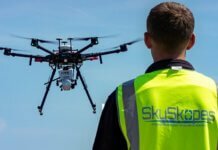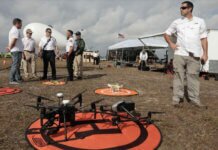On May 8, U.S. Sen. Roger Wicker, R-Miss. – chairman of the Senate Commerce, Science, and Transportation Committee – convened a hearing to consider the challenges of incorporating unmanned aircraft systems (UAS) and commercial space launch vehicles into national airspace.
Wicker invited Dallas Brooks, director of the Raspet Flight Research Laboratory at Mississippi State University, to share how Mississippi State is leading the development of UAS research and development.
Click here to watch Wicker’s opening remarks.
“To understand and mitigate safety risks and to improve the performance of systems and operators, it is important to fund research and development,” Wicker said. “In partnership with the Federal Aviation Administration, our research universities are helping to improve air traffic control interoperability, safety, pilot training and drone traffic management systems.”
Click here to watch Brooks’ opening remarks.
In his opening statement, Brooks highlighted how Mississippi State’s Raspet Flight Research Laboratory has built out unmanned systems infrastructure that has made the university a hub for flight research. Mississippi State University also leads the FAA’s UAS Center of Excellence.
“We operate the newest, largest and most technically advanced fleet of unmanned aircraft in academic use today,” Brooks said. “We hold FAA approvals to fly in over 6,000 square miles of national airspace… because we demand the same level of competence, the same level of professionalism and the same level of safety as any manned aviation organization in the country.”
Click here to watch Wicker’s questions.
In his questions to Brooks, Wicker probed how new layers of administrative review at the federal level have increased the time it takes to review UAS Center of Excellence research.
“The UAS center was the fastest stand-up of a center of excellence in history,” Brooks said. “We literally did it in about four-and-a-half months, from the date of award to our first contracts. We’ve been moving very, very quickly, and we tend to push on others to match our pace.”
He added, “Recently, there has been a move that the Department of Transportation has now exercised their right to review all projects in all of the centers of excellence, and all of a sudden our approval process has been delayed up to many months … We think one way to help is to remove some of these layers.”
Wicker committed to raising the issue with the FAA and U.S. Department of Transportation as a matter of oversight.










